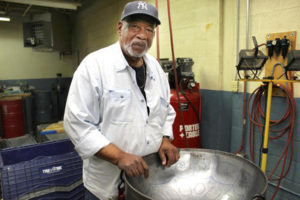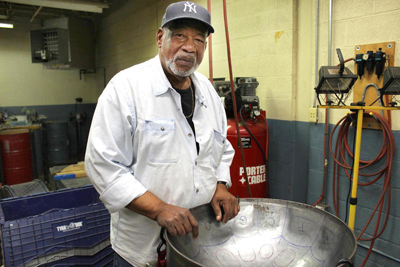 Alexis remembered as ‘musical genius’ by former student, fellow Trinidadian
Alexis remembered as ‘musical genius’ by former student, fellow Trinidadian
By Kelsey Rettkee
Alexis died after a months-long illness at Northwestern Medicine Kishwaukee Hospital in DeKalb. Liam Teague – current NIU Steelband director, professor of music and head of steelpan studies – spoke fondly of his former colleague and friend.
“He was like a father figure to me,” Teague said. “I’m 45, and he was 82, but we were the best of friends. From the first day I came to the [U.S.] at 18-years-old, he was there for me through practically everything.”
Born Jan. 15, 1937, in Port-of-Spain, the capital of Trinidad and Tobago, Alexis came to the states in 1964, first as a member of the National Steelband of Trinidad and Tobago, according to his obituary. He was known across the world as a performer, composer, instructor and builder of steelpan instruments.
Alexis taught for 12 years at a high school in St. Paul, Minnesota, and then at NIU’s School of Music from 1985 until his retirement in 2017. Alexis co-directed the NIU Steelband with Al O’Connor and, later, Teague. Alexis was given an honorary doctorate from NIU and awarded the lifetime achievement Chaconia Silver National Award from Trinidad and Tobago in October.
“[Alexis] came to this country with $5 in his pocket, and he didn’t really know how he was going to make it, but that’s a testament to his fortitude and vision,” Teague said. “He taught himself how to build and tune the musical instruments.”
Alexis lived in DeKalb with his wife, Yuko Asada, and is survived by his children.
“He was just one of those people [for whom] it wasn’t just about personal success,” said Teague, who lives in DeKalb. “He really opened many doors for a lot of younger people, myself included. And I think that’s why so many people are hurting, because they understood his generous spirit.”
Aside from his musical skills, Alexis’ legacy will be his effect on people, Teague said.
“There’s so much that could be said in terms of what [Alexis] has done for music, but one of the things that really stands out for him is how much he showed genuine love to people he cared about,” Teague said. “So many people talk the talk, go on social media and say how much they love you, but when it comes to really showing those actions, he was always there for me and all the others.”

